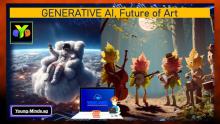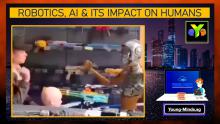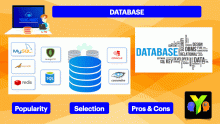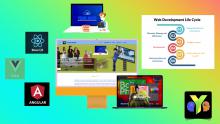The Rise of Generative AI: A Profound Exploration into the Heart of Technological Transformation
In our rapidly evolving digital landscape, Generative AI has emerged as a transformative force, reshaping the way we perceive technology and its applications.
Although the concept of Generative AI has been around for decades, it is the advent of groundbreaking technologies like ChatGPT by OpenAI that has revolutionized its significance in our daily lives. Today, Generative AI stands at the forefront of technological innovation, impacting every facet of our society and becoming an integral part of organizational strategies across various industries. In this article, we delve into the fundamental aspects of Generative AI, exploring its essence and examining the perspectives of industry experts and top leadership figures. Join us in this exploration, and stay tuned for our next article, where we will unravel a compelling story on Generative AI that promises to captivate your imagination and broaden your understanding of this transformative technology for the publication Industry through a small story.
In simple terms, Generative AI is a type of artificial intelligence that creates something new, like images, text, music, or even videos, based on patterns it learns from existing data. It's like a creative robot that can generate original content by understanding and combining the information it has been trained on. This technology has exciting applications, from generating realistic artwork to helping in creative writing, and it's changing the way we interact with technology in our daily lives. It involves the use of deep learning techniques, such as neural networks, to generate realistic and creative output.
Here are some quotes from top names in the AI industry on Generative AI and its potential to change the world:
- "Generative AI has the potential to unlock vast new possibilities in fields ranging from entertainment to healthcare to engineering." - Sundar Pichai, CEO of Google
- "Generative models are going to change the way we think about everything from software design to scientific discovery." - Ian Goodfellow, Director of Machine Learning at Apple
- "Generative AI is a key component of our strategy for unlocking the full potential of AI to solve complex problems." - Andrew Ng, Co-founder of Coursera and deeplearning.ai
- "Generative AI has the power to revolutionize how we create and experience art, music, and literature." - Fei-Fei Li, Co-director of the Stanford Institute for Human-Centered Artificial Intelligence
- "Generative AI is a game-changer for industries ranging from fashion to finance, enabling us to generate novel solutions to complex problems." - Demis Hassabis, Co-founder and CEO of DeepMind
Overall, Generative AI has the potential to transform various industries by enabling new forms of creativity, generating novel solutions to complex problems, and advancing scientific discovery.
Generative AI has the potential to impact a wide range of industries by enabling new forms of creativity, generating novel solutions to complex problems, and advancing scientific discovery. Here are some examples of industries that are likely to be impacted by generative AI:
- Collaboration: Humans, robotics, and AI can work together collaboratively to achieve better results. For example, a robot may perform a task that is difficult or dangerous for a human, while the human provides oversight and decision-making.
- Creative industries: Generative AI has the potential to revolutionize creative industries such as art, music, and fashion by enabling artists to generate new and unique content, textures, styles, and patterns. It can help create realistic 3D models, generate original music, or produce fashion designs.
- Healthcare: Generative AI can help healthcare professionals in a variety of ways. For instance, it can generate synthetic medical images, generate synthetic patient data to train healthcare AI models, and assist in drug discovery.
- Gaming: Generative AI has the potential to transform the gaming industry by creating new and realistic game environments, characters, and stories. It can also generate new levels, scenarios, and experiences for players, making games more immersive and engaging.
- Finance: Generative AI can assist financial institutions with fraud detection, risk assessment, and decision-making. It can generate synthetic financial data to train AI models and improve forecasting and modeling.
- Manufacturing: Generative AI can help manufacturers optimize their production lines, reduce waste, and increase efficiency. For example, it can generate synthetic data to train AI models that can detect defects in products and improve quality control.
- Education: Generative AI can help educators create customized learning materials for individual students, generate interactive simulations and visualizations, and provide feedback and assessment to students.
Overall, Generative AI has the potential to impact a wide range of industries and transform the way we work and live. As the technology continues to evolve and mature, we can expect to see more innovative applications of generative AI in various industries.
Generative AI, also known as generative modeling or generative adversarial networks (GANs), is a subfield of artificial intelligence that involves creating machines or algorithms that can generate new and unique outputs that are similar to those produced by humans.
Here are some definitions of Generative AI from top institutions around the world:
OpenAI: "Generative models are a type of unsupervised learning that involves training a model to generate new data that is similar to a given dataset."
MIT Technology Review: "Generative AI is the use of algorithms to create art, music, or other outputs that are both novel and believable."
Stanford University: "Generative AI is a type of machine learning that involves creating algorithms that can generate new and unique data that is similar to the training data."
IBM Research: "Generative AI is the ability of machines to create new and unique outputs, such as images, videos, and text, that are similar to those produced by humans."
NVIDIA: "Generative AI is a technique for training algorithms to generate new and unique outputs that are similar to those produced by humans, such as images, music, and even entire virtual worlds."
Overall, these definitions highlight the ability of Generative AI to create new and unique outputs that are similar to those produced by humans, using techniques such as machine learning and deep learning.
Don’t miss out our next article, we will unravel a compelling story on Generative AI that promises to captivate your imagination and broaden your understanding of this transformative technology for the publication Industry through a small story.










